Wedding venues: 'It's costing me £250,000 a month'
- Published
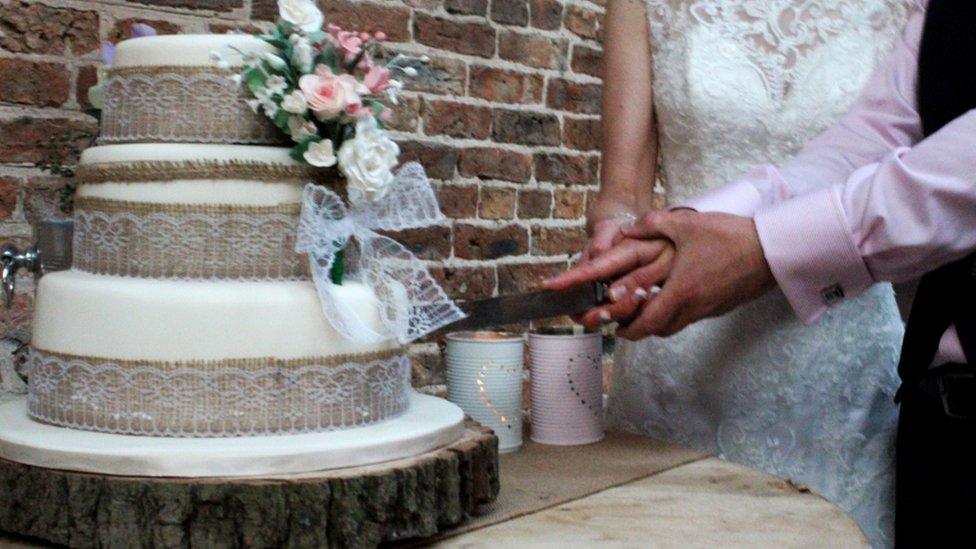
Will the reopening of the economy after lockdown come in time for the wedding industry?
In the grounds of Nunsmere Hall Hotel, in the heart of rural Cheshire, Chris Naylor has a huge, permanent, marquee which can seat more than 400 people.
If he ran a restaurant business, he could open the sides next week, when Covid restrictions on hospitality begin to ease, and serve about half that number, socially distanced. But this is a wedding venue and different rules apply.
From 12 April in England, only weddings with 15 guests are permitted. which is not financially viable. And most licensed wedding venues will not be allowed to open, unless they are outdoors.
Receptions for up to 30 guests can go ahead indoors from 17 May, while unrestricted weddings will be allowed from 21 June..
"It's so frustrating. I've got all this space and I can't use it. Easter is normally the start of the wedding season, but we can't get going," he says.
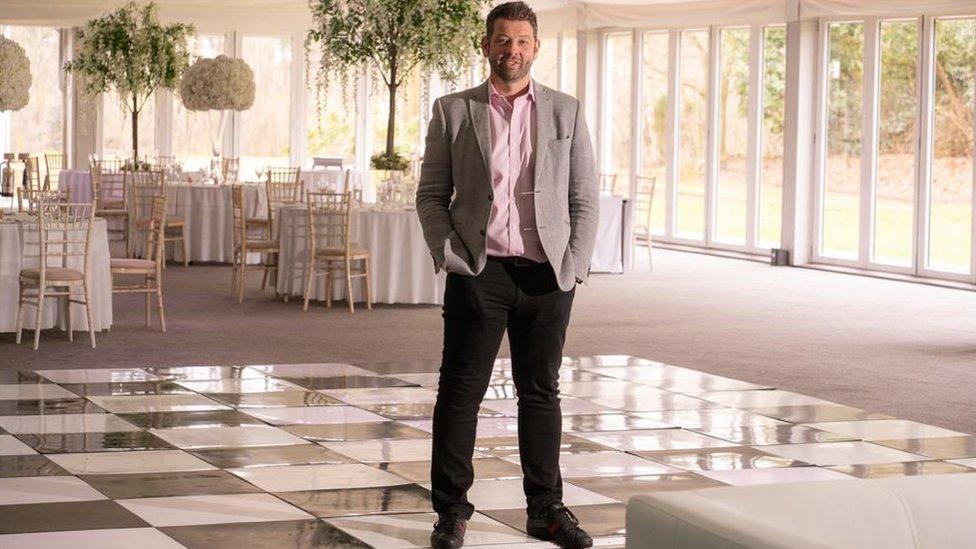
Chris runs three hotels in total which specialise in weddings. But he has held only a handful in the past year because of Covid restrictions.
"It's costing me £250,000 a month to stay closed," he says.
Chris says the industry needs time and clarity to prepare for a full June reopening, the start of what should be a wedding bonanza, given the backlog in couples eager to tie the knot.
"It's June or bust for many in this industry. Weddings are a very seasonal business and if we don't hit the June date, I fear a lot of businesses will give up or not be able to continue.
"We've basically got another two months of just waiting. It's having an impact not just on people's businesses, but on their personal well-being as well."
Chris is part of the UK Weddings Taskforce, set up last year to represent the sector, which generates an estimated annual £14.7bn for the economy.
Although it employs some 400,000 people, it's an industry that feels forgotten about.
Chris runs a multi-million pound company, but most of the businesses in this sector are small or sole traders, often women. And they're hanging on as best they can for the post-lockdown boom.
The wedding photographer
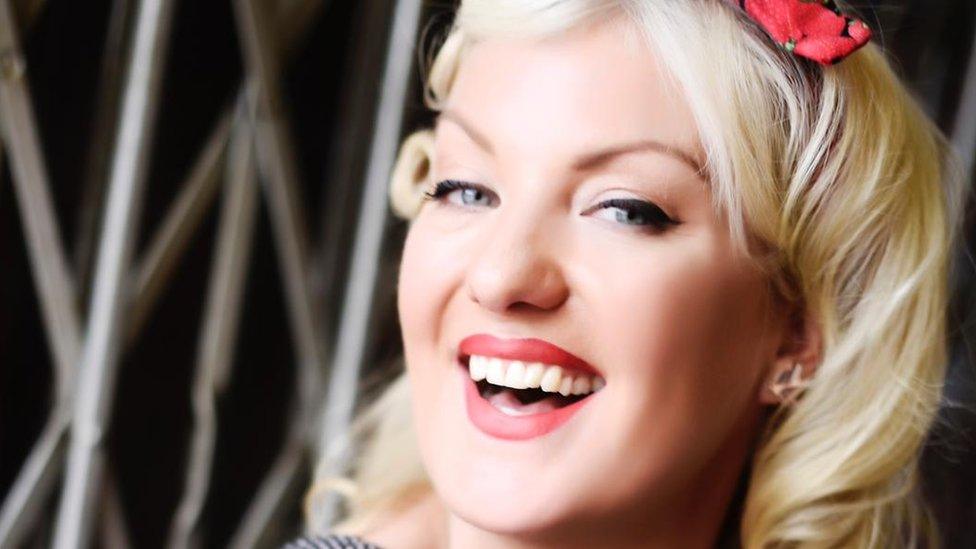
Caroline White has been a successful international wedding photographer for 17 years.
Most of her work is at one of Chris's venues, Peckforton Castle. It used to be a three-minute walk from her cottage, where she did all her editing and post production.
Caroline had 47 weddings lined up for 2020, but only managed four at the beginning of the year. Then her income vanished.
As a limited company director, she wasn't entitled to the same government support as self-employed workers. She has had to get by on furlough payments of about £800 a month.
But that wasn't enough to live on and pay her mortgage, so the 48 year-old had to sell her home. The new owner took the keys on 1 April.
"It's heartbreaking. It was my forever home. And it was the perfect set-up, so close to where I do most of my work. But I didn't have a choice really," she says.
"If I'd been registered as self-employed, receiving more government support, instead of a limited company director where I get very little, I think I could have hung on until we got going again."
Caroline wasn't able to secure any discretionary grants, but did take out a £20,000 Bounce Back Loan, which she could only use to cover some business costs, including a tax bill.
She did manage to secure a six-month mortgage holiday, but felt she still had little choice but to put her home up for sale.
"I live on my own. I wanted to relieve the financial uncertainty and pressure in an orderly, way. It's a quirky, 400 year-old Grade 2 style listed cottage and I knew it would take time to find the right buyer, which I've now done."
Caroline has now downsized and is now focusing on better times ahead. She has 64 weddings booked for this year and is raring to go.
"I absolutely love my job and working with all my couples. It's going to be amazing when it all starts again. People will be desperate to get together and have family portraits," she says
The wedding florist
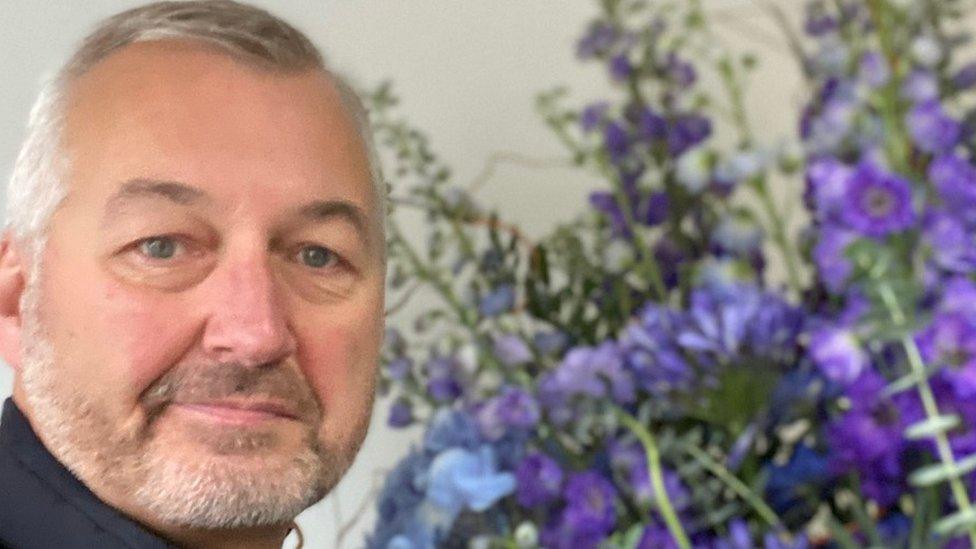
For Ian Lloyd, the pandemic has led to him giving up his shop in Wilmslow after 16 years. He's a high-end, high-profile florist and weddings are his speciality, as well as making up the vast majority of his sales.
"I've run a successful business for many years. But I just feel as an industry we've been left behind," he says.
"The toll has been financial as well as emotional, because you're also dealing with brides who are upset. When you're talking to 150 or so who are having to postpone two or three times, it gets to you."
He's had some tough decisions to make. He is now online-only, with the loss of three staff. The government support wasn't enough to cover his costs, he says. Ian's priority has been keeping his bigger floral events business alive.
"It's been massively frustrating. All during lockdown last year, we were limited to 15 or 30 people," Ian says.
"We do large events in castles, stately homes or huge marquees and yet we would drive past a restaurant that would have 100 people inside crammed in, all strangers.
"It seemed to be one rule for restaurants and hospitality and another one for weddings. If we'd been able to have 50 or 80 guests at weddings, that would have been viable for many to open. That would have taken some of the pressure off the supply chain."
As a limited company director, Ian has been running down his savings. His events business has received grants from his local council, but he's still nursing about £500,000 worth of lost sales.
Like many in the industry, Ian's now preparing to go from one extreme to the other, cramming two years' worth of weddings into one year's work.
"I've got four weddings for the week of 21 June," he says. "It's great to be finally talking to our brides with more optimism who think that their weddings will now happen."
The wedding audio-visual and entertainment business
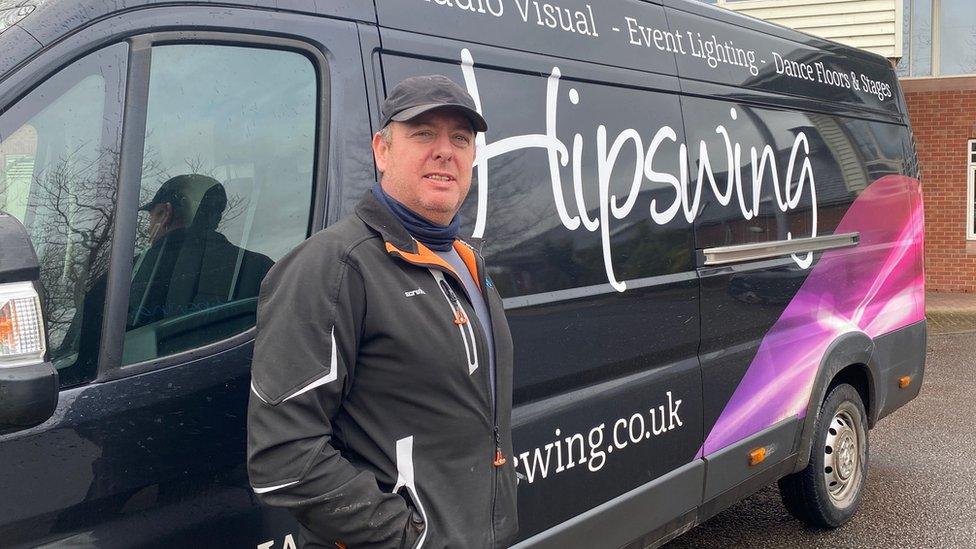
Scott Shorrock usually deals with dancefloors, lighting and general wedding entertainment, but over the last 12 months he's switched to driving a van and doing deliveries to make ends meet.
As the weddings dried up, he put his business, Hipswing, into hibernation. Then he and his wife Tansy, who "fell through the cracks" as limited company directors, decided to find other sources of income to pay the domestic bills.
"We didn't want to sit around. I've done deliveries for Hermes and through a family contact, I've also been earning money delivering and collecting lawnmowers for servicing. My wife's been working at a Covid test centre," says Scott.
"It's very hard because when we get home, we then have to keep working on our main business, answering emails and so on."
He says the financial support for Hipswing, especially from Cheshire Council, has been very good, with grants continuing to roll in - enough to keep things ticking over. But he has lost two colleagues. He also has a £50,000 Bounce Back Loan to pay back eventually.
"We managed to put some staff on furlough, one member of staff left and another asked for redundancy. If we'd known furlough was going to continue, we could have kept them all on," he says.
He too is desperate to restart: "We've adapted and survived and we're now keeping our fingers crossed that we're nearing the end."
The government has repeatedly insisted that a phased approach to weddings is necessary and the steps to reopening are clearly laid out in the roadmap published in February.
"We understand how difficult the pandemic has been for individuals and businesses, including those in the wedding industry, and our priority remains to protect people and livelihoods as we build back better from the pandemic," a spokesperson said.
"As set out in the Budget, the government has provided an unprecedented £352bn package of support to businesses across the UK, including by extending the Coronavirus Job Support Scheme and Self Employment Income Support to the end of September and providing £5bn for new Restart Grants."
- Published14 July 2021
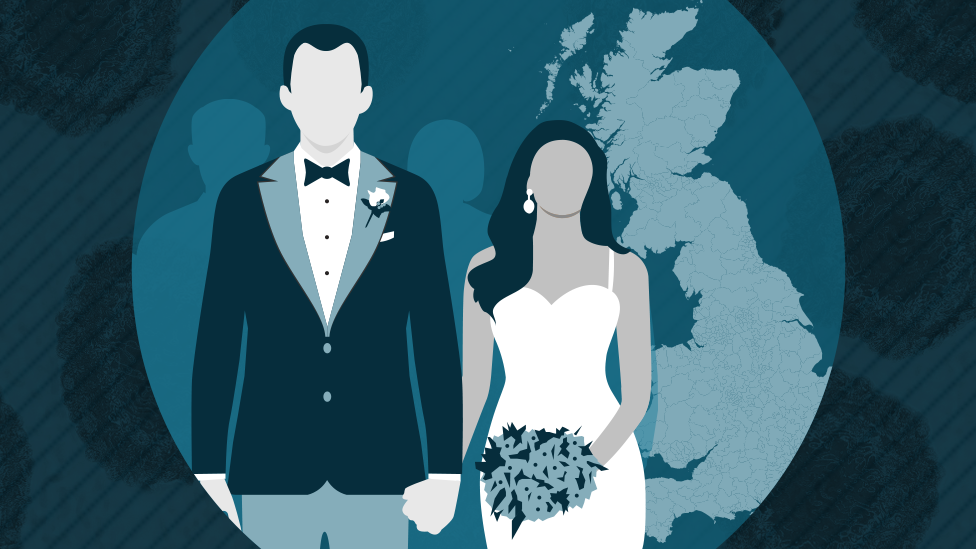
- Published1 July 2022
